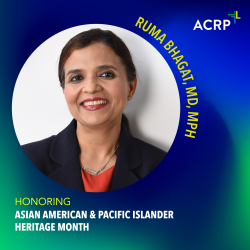In recognition of May being Asian American and Pacific Islander (AAPI) Heritage Month, ACRP reached out for some thoughts on the importance of the event to Ruma Bhagat, MD, MPH, Senior Director for Global Health Equity and Population Science at Genentech, where she leads cross-organizational efforts that advance health equity and inclusive research by broadening the scientifically driven representation of understudied patients in research. A member of the ACRP Diversity Advisory Council and a physician by training in San Mateo, Calif., in her nearly 19-year career with Genentech, she has focused on innovation, Good Clinical Practice, project management, and design thinking. At the recent ACRP 2024 conference, she presented on “Partnering with Community Health Centers to Diversify Study Enrollment.”
ACRP: Can you share some details on where you grew up, what you studied, how you first got drawn into clinical research, and what kind of duties you have now?
Bhagat: I’m a first-generation immigrant to the U.S. I grew up in India, completed my medical schooling, and after a year in clinical care I came to the U.S. to complete my masters in public health with a focus on international health systems management. I embarked on this journey aimed at making a substantial impact on healthcare systems, especially in the realm of health equity. Transitioning from clinical care to public health and then clinical research helps in bringing a multifaceted approach to addressing healthcare challenges.
My focus on international health systems management coupled with a passion to improve access to clinical trials and innovative therapies is grounded in my commitment to ensuring that healthcare reaches those who need it most, regardless of demographic, geographic, or socioeconomic barriers. At Genentech, a member of the Roche group, my role is to bridge the gap between healthcare research and real-world application, particularly in marginalized communities. Advocating for increased access to clinical trials and innovative therapies leads to promoting quality care and contributing to the broader goal of health equity.
ACRP: What does AAPI Heritage Month mean in your personal and professional life?
Bhagat: AAPI Heritage Month is a time to celebrate and honor the rich cultural diversity, contributions, and achievements of Asian Americans and Pacific Islanders in various fields, including technology, arts, science, literature, and beyond. Personally, it’s an opportunity for me to reflect on the cultural heritage of the AAPI community and deepen my understanding of its history, traditions, and experiences. Professionally, it’s a chance to amplify AAPI voices, promote inclusivity, and advocate for equity and representation in clinical trials.
ACRP: From what you’ve seen, can you characterize how active persons of AAPI heritage are as professionals and participants in clinical research in the U.S. versus what would be an ideal situation? What can/should ACRP and similar organizations do to address any gaps in this area?
Bhagat: From my experience, people of AAPI heritage are active professionals in clinical research in the U.S.; however, there is underrepresentation and barriers for certain groups within the AAPI umbrella in leadership positions and in specific areas of research. There is also disparity in representation in clinical trials for the AAPI community.
The AAPI community is diverse and encompasses a wide range of cultures, languages, and backgrounds. To address any gaps in representation and participation, organizations like ACRP and others focused on the clinical research enterprise can take several steps:
- Diversity and Inclusion Initiatives: Implementing robust diversity and inclusion initiatives to ensure equitable representation of AAPI individuals at all levels of the organization and in clinical research teams.
- Outreach and Engagement: Actively reaching out to AAPI communities to increase awareness of clinical research opportunities, provide education about the importance of research participation, and address any cultural or linguistic barriers that may exist.
- Mentorship and Leadership Development: Establishing mentorship programs and leadership development initiatives specifically targeted toward AAPI professionals in clinical research to support their career advancement and foster a pipeline of future leaders.
- Cultural Competency Training: Providing cultural competency training for clinical research professionals to ensure that they are sensitive to the needs and perspectives of AAPI participants and colleagues.
- Collaboration and Partnerships: Partnering with AAPI community organizations, academic institutions, and other stakeholders to collaborate on research projects, community outreach efforts, and advocacy initiatives.
By actively addressing these areas, stakeholder organizations can help to create a more inclusive and equitable environment for AAPI professionals and participants in clinical research, ultimately advancing the collective goal of improving health outcomes for all communities.
ACRP: Are there often clinical trials sponsored by Genentech, or in your area in general, that are or could be conducted to adequately serve the local AAPI population in terms of conditions that affect them more than other populations? For any that are conducted, is patient recruitment/outreach for persons of AAPI heritage a well-developed process or more of a challenge each time?
Bhagat: Historically, there has been underrepresentation of minority populations, including AAPI individuals, in clinical trials. This underrepresentation can stem from various factors, such as cultural barriers, language barriers, lack of awareness, and mistrust of the healthcare system. Recruiting and outreach efforts for clinical trials targeting the AAPI population can be both a well-developed process and a significant challenge, depending on various factors. Efforts to improve representation often involve community engagement, culturally sensitive outreach strategies, language accessibility, collaboration with community organizations and leaders, and targeted education campaigns to raise awareness about the importance of clinical research.
Efforts to enhance AAPI representation in clinical trials are ongoing, with initiatives aimed at increasing diversity in research participation and addressing barriers to recruitment and retention. These efforts are crucial for advancing health equity and ensuring that healthcare interventions are effective for all populations, including the AAPI community.
In closing, I am proud of my AAPI heritage and journey from India to the U.S., coupled with my diverse educational background and professional experiences, which equip me with a unique perspective and skill set to navigate the complexities of healthcare systems and drive meaningful change.
Edited by Gary Cramer




